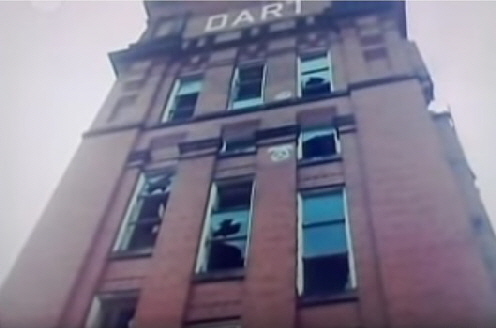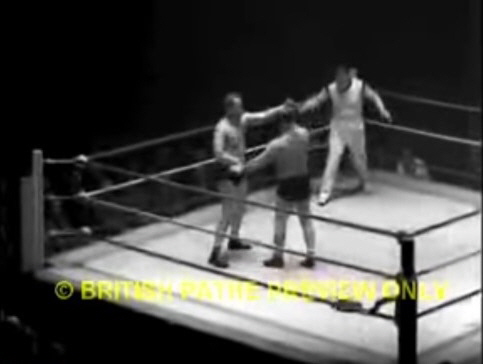Dart Mill, Union Road, Bolton
Austin Melia (senior) became Chief Tenter (Engineer), for the Dart and Alexandra Mills in Bolton. Almost fifty years after his death Fred Dibnah dropped a part of the same mill, the ‘Dart Mill Tower’. A 1985 clip of this demolition can be seen on YouTube.
Frank Finlay (actor)
The butcher’s boy mentioned in chapter 8 worked for Josiah Finlay, a family butcher based in Farnworth, near Bolton. Mrs Finlay’s young baby, Frank, was Frank Finlay, who later grew up to become a well-known actor (‘Casanova’; ‘Bouquet of Barbed Wire’). Catherine Melia was a good friend of his mother.
Norman Giroux
Norman Giroux, often referred to as ‘Norm’ in the book, was a recognisable character in the Blackpool area. He was famous locally for running Fox Moth biplane rides over the pleasure beach and surrounding areas, from the 1920s to the 1950s. Thomas Melia had an interest in his business for a time.
George Gregory
George Gregory stood in the dock as one of the accused. He was universally recognised as the British Heavyweight Wrestling Champion during the war years. Gregory’s reign came to an end at Belle Vue, Manchester, on January 25th 1945, when Ben Assirati beat him.
Klaus Fuchs
Klaus Fuchs confessed in 1950 that he had spied for the Russians. A brilliant physicist, he worked on the Manhattan Project at Los Alamos which built the first atomic bomb. Family anecdote instructs that Edward spent some time in a cell with Fuchs, although it has not been possible to definitely prove the case. However, both he and Edward did spend time in Wakefield Prison during the early part of 1950, and neither were seen as high-risk prisoners. It is entirely possible that they were both incarcerated in a cell together.
Shot down enemy aircraft
During WW2, Melias Transport carried shot-down enemy aircraft on the back of their lorries, as well as Merlin engines; the ones used in Hurricanes and Spitfires.
Godfrey Heilpern
Godfrey Heipern was the KC who assisted Neville Laski in defending Edward. Twenty-five years later he was the QC defending Myra Hindley, the infamous Moors Murderer. Harold Laski, Neville Laski’s brother, was chairman of the British Labour Party in 1945 and 1946, not long before Edward’s trial.
John Musgrave & Sons
John Musgrave & Sons made over 500 steam engines during the latter part of the nineteenth century. Some of these are preserved in museums across the country, notably the Museum of Science and Industry in Manchester, and the London Science Museum. Melias Transport bought the ‘Admiralty Room’, the room where the boiler plates were once made, for its head office and warehouse, just after WW2.
Dobson & Barlow
Dobson & Barlow’s history starts with Samuel Crompton, one of the founding fathers of the Industrial Revolution. Thomas Melia was a good friend of Benjamin Dobson, and the business transported their products across the country.
Northern Scientific Equipment Ltd
Melias Transport also carried the products of Northern Scientific Equipment Ltd. Northern Scientific is famous for being started by German refugees fleeing Nazi persecution. After the war, Werner Rothschild, a former Zeiss employee, and Ernst Leist, developed the ‘Witness Camera’. From a technical perspective it was comparable to the best in the world, but the product failed on the marketing front, primarily due to its cost. Witness camera sets can now fetch well over £10,000 at auction.
Bastardy Orders & Henry Warburton
Bastardy orders were a method of ensuring that the costs of supporting illegitimate children were not carried by the state (or ‘parish’). A woman would lodge a complaint with a petty sessional court asserting that a particular man was the father of her (illegitimate) child. The court would review the evidence and make a determination, although the bias often seemed to be in favour of the complainant.
Henry Warburton was a magistrate in Edward Melia’s bastardy court case. He led the development of Warburtons bakery during its early years and later became mayor of Bolton during 1930 - 1931. Warburtons continues to be a well known bakery group both locally and nationally. The author worked for the company for a year between mid 1979 and mid 1980.
H.M.S. Carnarvon
One of six ‘Devonshire Class’ cruisers built during the first decade of the twentieth century, H.M.S. Carnarvon participated in ‘The Battle of the Falklands’ before being assigned to the North America and West Indies station in 1915. She continued to patrol the North Atlantic and escort convoys until the end of WWI. The ship was used as a training facility for a few years after the war before finally being scrapped in 1921.
Gandi’s 1931 visit to Lancashire
The Indian cotton boycott was widely believed to have exacerbated an already depressed Lancashire textile industry. While perhaps not the most important factor it was nonetheless identified by many industrialists of the time as a principle target. Expectations were therefore high when late on a Friday evening on September 25th 1931 he arrived at Spring Vale Station in Darwen, Lancashire. After meeting with the mayor, and then touring the town’s Greenfield Mill, he went on to visit a local philanthropist, Annie Barlow, at her home in Edgworth (Greenthorne). Despite goodwill on both sides, the two had different agendas. While the Lancastrians wanted to persuade Gandi to stop the boycott, Gandi’s objective was to use the visit as an opportunity to explain Indian nationalism. As a dialogue it was doomed to failure; little was achieved.
Annie Barlow was the daughter of James Barlow, a partner in a well-known local textile company, Barlow and Jones. Her brother, Thomas Barlow, was physician to Queen Victoria, King Edward VII and George V. She was also known locally for donating the Barlow Institute and some adjacent land to the Edgworth village community
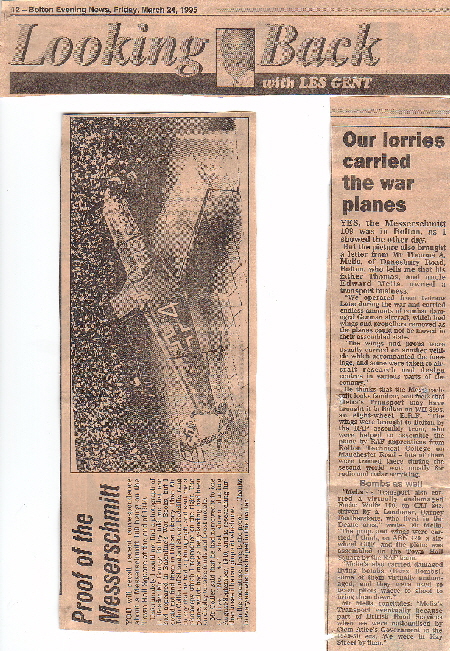
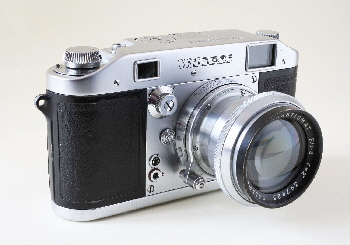
The Witness Camera
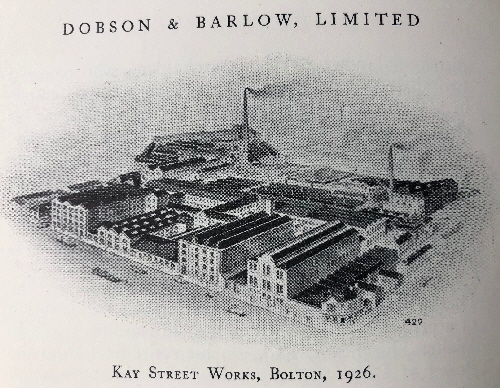
Above - Dobson & Barlow a few years after Melia’s Transport starting doing business with them. Below - book on Samuel Crompton and Dobson & Barlow; also published by the company. It was given to Thomas Melia in 1927 for his son, Austin.
of interest, maybe...
serendipity and other bits of random information
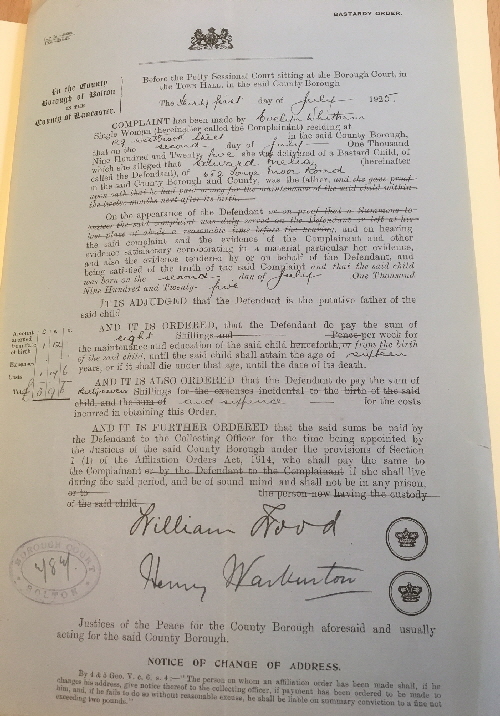
1925 Bastardy Order served on Edward Melia
Austin Melia’s letter to Bolton Evening News 1995
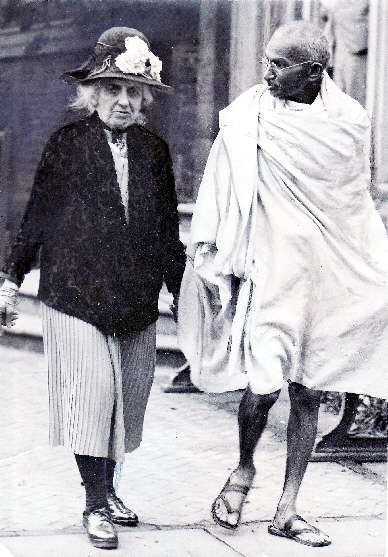
Gandi and Annie Barlow, September 1931
Gandi in Darwen, September 1931
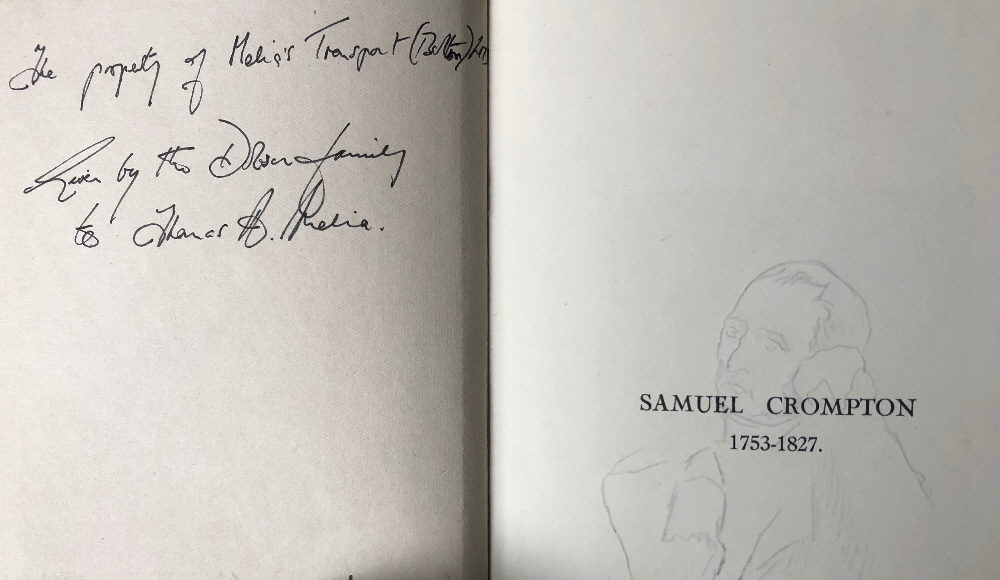
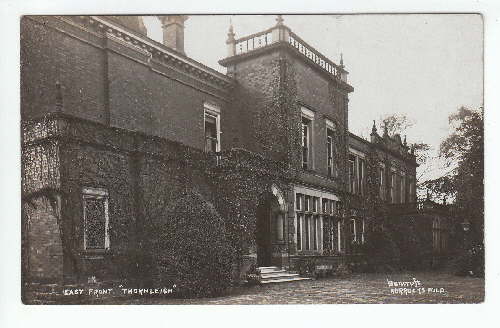
Thornleigh Salesian College, Bolton
Thornleigh was founded in 1925 by an order within the Catholic Church, The Salesians of Don Bosco. Gerard Melia spent his secondary school years there, as did the author. Perhaps its most well-known former pupil is Danny Boyle, Oscar winning director of ‘Slumdog Millionaire’ and a host of other movies, and of course the opening ceremony for the 2012 Olympics held in Great Britain. I have a vague recollection of discussion the merits of a King Crimson album with him on one occasion, but other than that our paths did not cross. He was after all two years above my year at school, a gap that seemed too wide to bridge at the age of 13.
An early twentieth century photo of what later became the Thornleigh College Priests House.
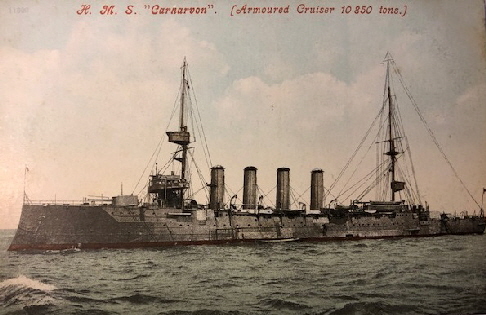
H.M.S. Carnarvon
Unknown. Possibly Bolton Evening News
Early postcard
Old advert
Early postcard
Youtube share sourced but see: https://www.gandhiserve.net/
Family owned book inscription
